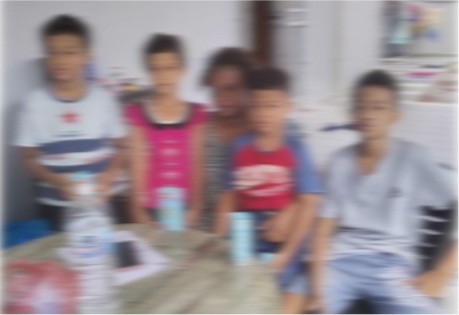A SI woman returned home after neglected by her logging husband in Malaysia
AT a very young age, Ira (not her real name) was excited to marry a foreigner because of the financial gains that comes with the new relationship.
Ira, who is part Malaita and Western province, was 19-years-old, when she met and married her 43-year-old Malaysian husband.
This happened after she left high school at Form 3.
Her husband works in a logging operation in Solomon Islands.
She normally travelled with him around the provinces working in different logging camps.
Ira refused to use her real name and identity for reasons she will reveal in this story.
The happy couple married in 2009 after signing their marital certificate at the Honiara Magistrates Court, before they left for Malaysia.
However, their marriage turned from honeymoon to rejection when they lived in Sarawak after her husband and his family neglected her.
However, through the help of close friends, family and Malaysia immigration department, Ira, now 33 years old, finally returned home on 27 August 2024.
She could only travel back to Solomon Islands with her three-year-old last born child.
Her four other children have been taken away from her by her husband’s family during the COVID pandemic and she had not seen them since.

“I do not want to reveal my identity yet because I am now trying to get my other children back to Solomon Islands,” Ira said.
Recalling the early days of her marriage, Ira said life was good.
“We were happy and as a wife I followed my husband to work in various logging operations in the provinces like Malaita, Isabel and Western Province,” Ira said.
The happy couple then left Solomon Islands to live in the husband’s home country in Malaysia.
The couple lived in Sarawak in a rental apartment and their children were enrolled in a school by their father.
“At first, everything seems fine.
“I live with our children in a rental apartment while my husband moves around with his work in logging operations and other business activities.
“It was not easy living alone and raising the children when my husband is away with work. But unlike other loggers who neglected their children’s education and welfare, my husband continued to support myself and the children,” Ira recalled.
After a few years, the relationship between Ira and her husband deteriorated.
“At first my husband’s behavior changed. He got angry, aggressive and manipulative.
“Not long after my husband stopped allocating us money for food and to buy other essentials.
“Being a housewife and jobless it became very challenging,” Ira said.
She said to make matters worse, her in-laws also supported their son’s (Ira’s husband) actions against her.
“The usual mistreatment I receive from my partner and in-laws often made me want to return home to Solomon Islands with my children,” Ira said.
But things got worse during the COVID-19 pandemic when Ira’s in-laws went to her apartment and took the children away.
This left her alone in the apartment but gave her the strong determination to leave Malaysia.
“For a whole month, I was left in isolation. I have no food, no money and nothing else.
“I felt so neglected,” she said.
“I thought my in-laws would take the kids and returned with some money and food but no one came after they took them away.
“The day they took my kids, they also locked the main gate of the apartment, cut off the water supply and did not provide any food for me.
“I have a feeling then that my in-laws did not want me and so they are avoiding me. I also think they just wanted me dead,” an emotional Ira said.
She was very lucky that a neighbor from Jayapura in West Papua helped her with food and water.
“My neighbor friend from West Papua and my other friends fed me during these darkest moments in my life. To communicate with them or use a mobile phone, I used a small hole through the gate to seek help and asked for food and water.
“That was how I survive during my lock-up days inside the apartment,” she said.
Ira was also in constant communication with family and relatives who provided her with little financial support.
This was to enable her to get food and other essentials with the help of her friends through the hole at the gate.
Her emotional mother told Solomon Star that for years she always thinks about her daughter Ira and her grandchildren.
“I knew my daughter needed help and wanted to return to Solomon Islands,” her mother said.
Ira’s mother said she did try helping her daughter by reaching out to responsible authorities at the Ministry of Foreign Affairs and Trade, as well as other government authorities, but nothing worked out.
The mother said it was not until one of her relatives stepped in and offered support to find ways to getting Ira back into the country, that they started making progress on her return.
“We reached out again to the Ministry of Foreign Affairs, then to the Office of the Prime Minister and other key responsible authorities before we started making progress.
“We never gave up. We continue to push hard to facilitate Ira’s trip home. Through all these years I kept praying for my daughter’s return,” her mother said.
Ira’s journey to freedom was finally facilitated in August this year when she was able to return home after 15 years in Malaysia.
Ira described her return as “a relief and escape to freedom.”
“I have been through a lot of suffering, being left abandoned, neglected, pushed away, and mistreated by my husband. So, I am happy to be back with my people,” Ira said.
She managed to return with her last-born child.
The other four children are still with their grandparents back in Malaysia.
She missed them so much and is now working hard to try and get them over here.
However, Ira said work to arrange for her return flight was not easy and she was thankful for those who have supported her.
She said one of the challenges she faced was lack of a diplomatic mission in Sarawak, Malaysia.
The only nearest Solomon Islands Consulate General is in Jakarta, Indonesia.
Despite this setback, she said it was through the support of many people that enabled her to return safely home.
She said authorities working on my return flight involved Malaysian Immigration that worked with some relatives and friends back in Solomon Islands.
“They helped to sort out all my travelling arrangement and paper documents for passport with my child,” she said.
“The air tickets to return were facilitated by a friend plus family members and relatives living in Honiara.
“There were a number of fundraisings activities being held to help facilitate our air ticket with no any help from any organisations, immigration office or prominent leaders,” she said.
Through the fundraising activities, Ira’s family first deposited $5,600 and then made a deposit of more than $14k.
This enabled to meet the $20,000 airfare for them.
The payments for air tickets were done through Guadalcanal Travel Service (GTC).
Ira said she was lucky because her passport is still valid which enabled her to travel.
However, Ira said the Singapore Immigration almost detained her due to the validity of her passport but somehow, they let her through.
She first transited to Singapore then on to Port Moresby in PNG and finally to Honiara.
However, Ira said there are many other women and girls from Solomon Islands and other Pacific Island Countries who are still experiencing what she went through.
However, they could not return to their home countries because of passports issue.
She said there are other women and girls from the Pacific that face similar situation in Jarawak.
“They become powerless, being neglected and suffered abuse. One of the main challenges these women face is the validation of their passport.
“Once their passports expire, the husbands just left them,” Ira revealed.
She added these are not only Solomon Islands ladies but also women from other Melanesian countries like PNG.
She told the Solomon Star that she was surprised to see a good number of Solomon Islands girls and women who are living in Sarawak and other parts of the region and they have nowhere else to go.
“Most of the girls ended up there after marrying Malaysian loggers who came to work in Solomon Islands.
“Most of them travelled with their husbands to Malaysia. Upon their arrival they were abandoned or left to support for themselves.
“Many of them cannot escape because they are faced with expiry of their passports.
“And once their husbands abandoned them, they do not have money to attend school, no place to stay and no money to pay food and basic needs.
“Many of them are crying wanting to return home to their families,” she said.
Ira added that some even turned to prostitution within the urban centers and cities to survive.
“It’s a sad reality for our local women,” she said.
However, Ira said the fight to get her remaining children is far from over.
The plight of Ira and other women in similar situations highlights the urgent need for more awareness to our local girls about the risk associated with forced marriages linked to logging operations.
According to a research report commissioned by the Solomon Islands Ministry for Women, Youth, Children and Family Affairs and the International Organization for Migration (IOM) back in 2019, it found that logging operations has created risks of human trafficking, sexual exploitation and forced marriage for local women and girls.
In 2017 a report conducted by the United States Department says that local children, young girls were forced to do labour or commercial marriages in exchange for money or goods, particularly near foreign logging camps, on foreign and local fishing vessels, and at hotels and entertainment establishments.
Chief Immigration Officer Christopher Akosawa said some years back that logging, fishing and mining industry were creating booming avenues for human trafficking.
In 2015, the Solomon Islands Government (SIG) also established the Anti-Human Trafficking Advisory Committee (AHAC) which is an intergovernmental and stakeholders’ framework combating the ‘Trafficking in persons’ issue.
The Committee recently adopted a five-year work plan to eliminate sex trafficking – from 2020 to 2025.
The report said that more awareness needs to be done as the majority of the people in the community are not fully aware of the information and issues involving trafficking of women and girls.
By ULUTAH GINA
Solomon Star, Gizo









